人教版高中英语选修7Unit4SharingPeriod 1 Sharing 优秀教案
高中英语配套课件:选修7 Unit 4 Period 1(人教版)
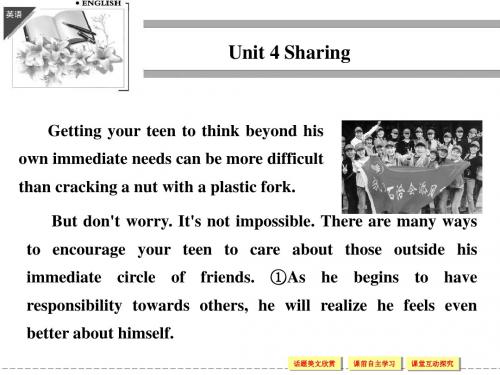
to think beyond their own immediate needs partly
because they are facing many challenges. ( T )
Hale Waihona Puke 2. The underlined phrase “buy into” in Paragraph 3 probably means spending money on. ( F )
话题美文欣赏 课前自主学习 课堂互动探究
Not sure how to convince a teen to get away from the cell
phone and into a community project? Teens buy_into
community service when the project or program is in an area of their interest. “Finding something in an area of interest for them keeps them motivated and inspired,” Maidenberg says. For instance, if he is interested in culinary(烹饪) school, he could volunteer in a soup kitchen or bake for a project that supports families in need. ③Volunteer projects in your teen's area of interest will build her knowledge base as well as help
高中英语book7 unit 4 sharing 全单元教案新人教版选修7
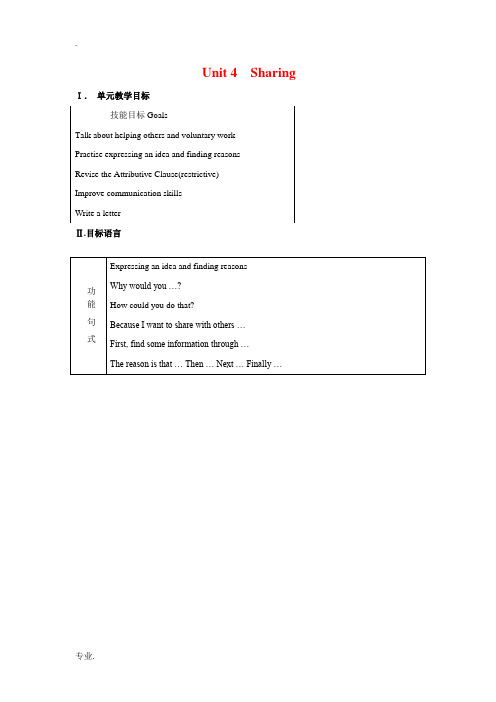
Unit 4 Sharing I.单元教学目标Ⅱ.目标语言III. 教材分析与教材重组1. 教材分析本单元以Sharing为话题,旨在通过单元教学,使学生了解世界上很多地方依然很落后,从而懂得同情,学会分享。
结合针对短文话题的探讨激发学生的国际意识,通过各种渠道力所能及地为贫困地区的孩子做出自己贡献。
1. 1 WARMING UP 提供了三项任务。
通过完成这些任务让学生懂得什么是“帮助〞,并且反思自己是否乐于助人,以及怎样做才是“志愿者〞,由此为后面的短文学习做好铺垫。
1. 2 PRE-READING是READING的热身活动。
其中介绍了短文主人公Jo,还根据她在PNG拍的照片提出了5个问题,使学生在阅读之前就简单了解短文内容。
1. 3 READING是一篇Jo写给Rosemary的信。
其中介绍Jo在PNG(Papua New Guinea)的所见所闻,使学生感受到PNG的儿童生活艰难,从而珍惜自己的学习机会。
.1. 4 COMPREHENDING 是根据短文设计的阅读理解试题。
1. 5 LEARNING ABOUT LANGUAGE分词汇和语法两部分。
其中,第一部分是有关此篇短文中的重点单词和短语;第二部分是有关限定性定语从句的复习。
1. 6 USING LANGUAGE是对READING的延伸。
通过阅读,参与“Give an unusual gift〞的活动。
1. 7 LISTENING AND SPEAKING通过Jennifer Wells的采访介绍了Mary Murray作为MSF的一个volunteer的工作经历,而且针对这一话题展开Speaking。
1. 8 WRITING 根据LISTENING AND SPEAKING话题运用时间表达方式进行写作。
2. 教材重组2.1 从话题内容和训练目的上分析,WARMING UP与LISTENING AND SPEAKING相一致;从教材份量来说,可将WARMING UP与LISTENING AND SPEAKING的1、2、3、4项和Workbook中的LISTENING以及LISTENING TASK整合在一起,设计成一节任务型“听力课〞。
高中选修7 Unit 4 Sharing 第一课时教案
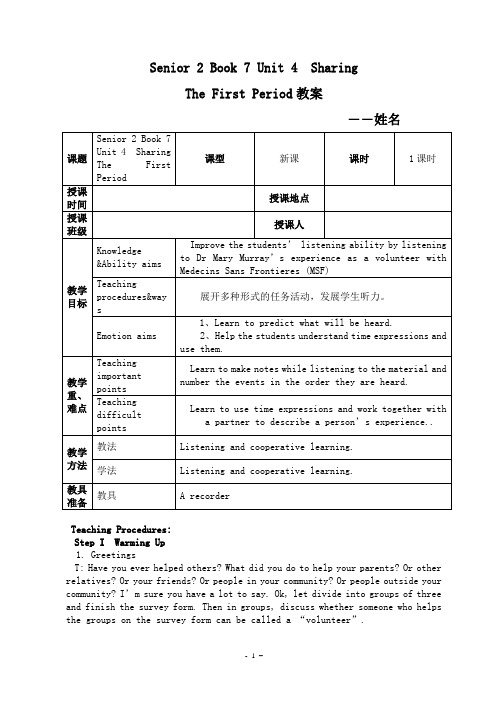
Senior 2 Book 7 Unit 4 SharingThe First Period教案――姓名Teaching Procedures:Step I Warming Up1. GreetingsT: Have you ever helped others? What did you do to help your parents? Or other relatives? Or your friends? Or people in your community? Or people outside your community? I’m sure you have a lot to say. Ok, let divide into groups of three and finish the survey form. Then in groups, discuss whether someone who helps the groups on the survey form can be called a “volunteer”.Step II Listening(I)(The teacher plays the tape and the students listen to it.)T: Now let’s check the answers of Exercis e 1 and 2.(The students will answer the questions)T: Now let’s listen to the dialogue for a second time. When you are listening, you can check the answers of Exercise 2 and finish Exercises 3 and 4. Learn to make notes about Mary’s experiences in the ta ble on Page 35. And share your notes with your partner and then with other groups.(The students will makes notes, and share their notes.)T: Ok, let’s listen to it for a third time to check the notes.Step III Listening(II)T: Perhaps you may wonder, because we are students, what we can do to help. That is, what can we do to serve communities outside the school? Ok, let do LISTENING in the workbook on Page 70. You are also required to predict what you will hear, according to the four questions.Step V AssignmentT: Boys and girls, today we have listened to two materials about giving help to others. I do hope all of us will help those who need help. Besides, you should learn to predict what you will hear before listening and pay attention to the time expressions while listening.Step VI Homework1. Finish the LISTENING TASK on Page 75-76. Remember to predict what you will hear according to the given information and also pay attention to time expressions.2. Google for more information about MSF and share it between us.。
人教版高二英语选修7_Unit_4_Sharing_全单元教案
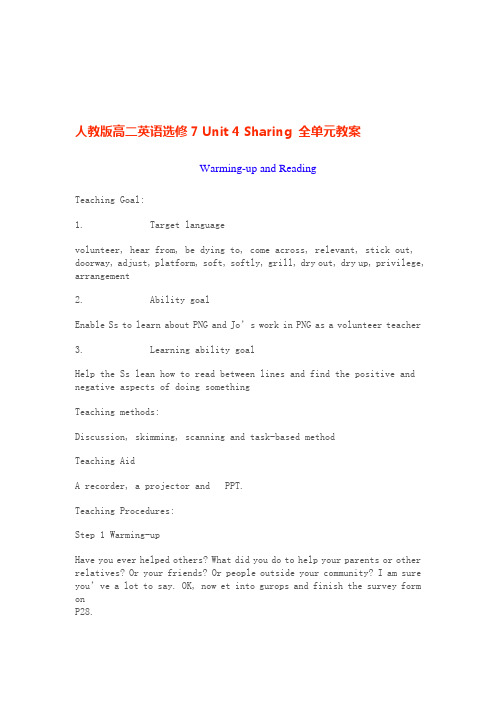
Enable Ss to learn about PNG and Jo’s work in PNG as a volunteer teacher
3. Learning ability goal
Help the Ss lean how to read between lines and find the positive and negative aspects of doing something
8._____ started crying “ieee ieee” to welcome them.
9._____ led us to alow bamboo hut.
10._____ was going to share the platform with Jenny and Jo.
11.________ softly talked to each other in their language Jo didn’t understand
5._____ becamea lot more imaginative when teaching.
6._____ started jumping out the windows during a chemistry experiment.
7.________ visited a village that was the home of one the boys, Tombe.
Task-based method and fast reading
Teaching aids:
A recorder, a projector, a compute connected to the Internet.
人教版(新课程标准)选修7Unit4Sharing复习课件

10.in need在困难中;在危急中 in need of 需要…… satisfy/meet one’s needs 满足某人的需要 There is no need(for sb) to do sth (某人)没有必要做某事 eg. (202X·济南模拟)In addition,whenever he met people in need,he was always helping them. 另外,无论何时他碰到困境中的人们,他总是帮助他们。
目录
6.dry out(使浸水等之物)完全变干;干透 dry up (指河流;井等)干涸 eg. Water the plant regularly, never letting the soil dry out. 经常给植物浇水,别让土壤干透了。
目录
7.otherwise conj.否则;不然 adv.除此以外;其他方面;用别的方法 (apart from that);其他地;不同地(differently) or otherwise 或相反;或其他反面 eg. (江苏卷书面表达)Otherwise we’ll have to answer for our selfishness sooner or later. 否则的话我们早晚会为我们的自私付出代价。
目录
8.privilege n.特权;特别优待 v.给予特权;特别优待 •It is a privilege (for sb) to do sth(某人)有幸做某事 have the privilege to do sth/of doing sth有做某事的特权 •privileged adj.享有特权的;荣幸的;荣幸的 be privileged to do sth 做某事是荣幸的 eg. It is a great privilege for me to invite you to participate in the Chinese Speech Contest for foreigners at my school next Saturday. 我很荣幸邀请你参加下周六在我校举行的外国人汉语演讲比赛。
人教版高中英语选修7《Unit4Sharing》教案
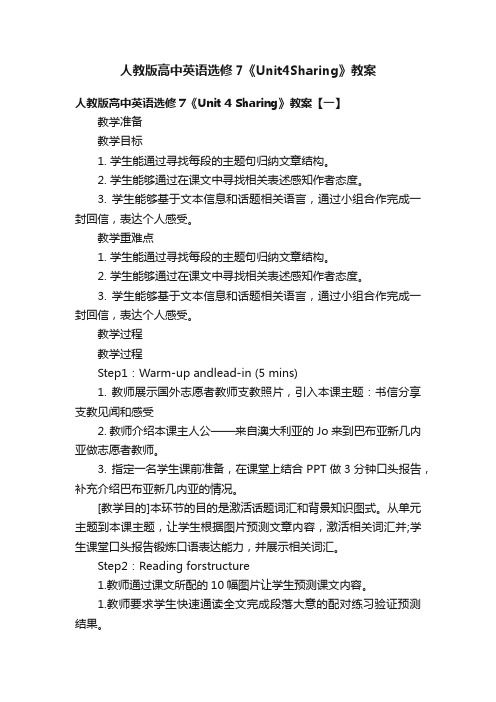
人教版高中英语选修7《Unit4Sharing》教案人教版高中英语选修7《Unit 4 Sharing》教案【一】教学准备教学目标1. 学生能通过寻找每段的主题句归纳文章结构。
2. 学生能够通过在课文中寻找相关表述感知作者态度。
3. 学生能够基于文本信息和话题相关语言,通过小组合作完成一封回信,表达个人感受。
教学重难点1. 学生能通过寻找每段的主题句归纳文章结构。
2. 学生能够通过在课文中寻找相关表述感知作者态度。
3. 学生能够基于文本信息和话题相关语言,通过小组合作完成一封回信,表达个人感受。
教学过程教学过程Step1:Warm-up andlead-in (5 mins)1. 教师展示国外志愿者教师支教照片,引入本课主题:书信分享支教见闻和感受2. 教师介绍本课主人公——来自澳大利亚的Jo来到巴布亚新几内亚做志愿者教师。
3. 指定一名学生课前准备,在课堂上结合PPT做3分钟口头报告,补充介绍巴布亚新几内亚的情况。
[教学目的]本环节的目的是激活话题词汇和背景知识图式。
从单元主题到本课主题,让学生根据图片预测文章内容,激活相关词汇并;学生课堂口头报告锻炼口语表达能力,并展示相关词汇。
Step2:Reading forstructure1.教师通过课文所配的10幅图片让学生预测课文内容。
1.教师要求学生快速通读全文完成段落大意的配对练习验证预测结果。
2.教师引导学生归纳出全文的整体结构。
[教学目的] 本环节的目的是让学生了解文章的整体结构。
不仅让学生学会寻找中心句,而且让学生从每个段落的中心句归纳出课文整体结构,让学生回顾信息交流类书信的写作结构。
Step3:Reading fordetails (10 minutes)1.教师要求学生先同桌配对合作,然后按照学习小组分组合作,仔细阅读文章细节找出信息,完成下列表格(划线部分是学生需要填出的部分):2.教师引导学生根据文章中的相关语言和信息体会作者的感情和态度。
高二英语(人教版)-选修七 Unit 4 sharing (1)

选修七 Unit 4 Sharing (1) 高二年级 英语
Warming up: Sharing
What?
time money knowledge experience …
love concern sadness happiness …
Lesson 1 A Letter Home Reading
Part 1 Appreciate the language
• When I reach the school grounds there are lots of “good mornings” for me from the boys.
• Many of them have walked a long way, sometimes up to two hours, to get to school.
Part 1. Jo’s school life Part 2. Local people’s life
Para. 2-3
Para. 4-8
The purpose of the letter
Dear Rosemary, Thanks for your letter, which took a fortnight to arrive. It was wonderful to hear from you. I know you’re dying to hear all about my life here. So I’ve included some photos which will help you picture the places I talk about. be dying to do = be eager to do fortnight = two weeks
高中英语Unit 4 Sharing--Period1人教版选修七

Unit 4 SharingPeriod 1 A sample lesson plan for reading(ALETTER HOME)IntroductionIn this period, after the warming up, students will first be guided to pre-read the text by getting to know about a place called Papua New Guinea. Then they shall read the text for forms and copy expressions. Writing a letter of your own comes before reading the text once again for the type of writing and summary of A LETTER HOME. The class shall end by students reading more on voluntary work.ObjectivesTo help students understand the text’s forms and contents and learn about sharingTo help students communicate on the topic in focus with the words, expressions and structures learned in this unitFocusAidsMultimedia facilities, tape-recorder, photos, diagramsProcedures1. Warming up by defining volunteerHello, class. Have you ever taken part in any volunteer work? No? Then welcome to our school volunteer work group. But first what is a volunteer?A volunteer is:* One who enters into, or offers for, any service of his own free will. * (Mil.) One who enters into service voluntarily, but who, when in service, is subject to discipline and regulations like other soldiers; -- opposed to conscript; specifically, a voluntary member of the organized militia ofa country as distinguished from the standing army.2. Pre-reading by getting to know about a place called Papua New Guinea Have you ever heard of a place called Papua New Guinea? Now read the fact sheet and the map.Facts of Papua New GuineaCapital: Port MoresbyGovernment: constitutional monarchy withparliamentary democracyCurrency: kina (PGK)Area total: 462,840 sq kmLand: 452,860 sq kmWater: 9,980 sq kmPopulation: 5,172,033 (July 2002 est.)Language: English spoken by 1%-2%, pidgin English widespread, Motu spoken in Papua regionNote: 715 indigenous languagesReligion: Roman Catholic 22%, Lutheran 16%, Presbyterian/Methodist/London Missionary Society 8%, Anglican 5%, Evangelical Alliance 4%, Seventh-Day Adventist 1%, other Protestant 10%, indigenous beliefs 34%3. Reading for formsIt is unlikely that you will understand 100 percent of the vocabulary in the text, especially at a first reading. Use first the context and then your own knowledge of the subject to help you guess the meaning of unknown words.Read the text to: cut/ the sentence into thought groups, blacken the predicates, darken the connectives and underline all the useful collocations.4. Copying collocationsA collocation is two or more words that often go together. These combinations just sound "right" to native English speakers, who use them all the time.While going over the text, try to recognize the collocations, treat them as single blocks of language and copy them out into your Collocation Book.Collocations from A Letter Homethanks for…因……感谢, be dying to do…急于做……, hear all about…了解所有关于……, include some photos附有几我照片, picture the places图象化这儿的地方, a bush school丛林学校, sometimes up to two hours有时长达两小时, adapt to…使适应……, one thing is for sure有一点是肯定的, become a lot more imaginative in…变得对……更富有想象力, a most challenging subject最富有挑战性的学科, show… a chemistry experiment向……演示……化学实验, bubble over everywhere到处冒气泡, come across…碰到……/见过……, make any difference对……有所改变, speak much Pidgin English说几句洋泾浜英语, the home of ………的家, have fantastic views看到奇妙的景色, down a steep slope to…走下一个通向……的陡坡, work in the garden 在花园劳作, shake hands with…与……握手, a low bamboo hut with grass sticking out of the roof 一个低矮的竹屋,屋顶上伸出一簇茅草, get through…进入……, lay… on…放置……在……上, a newly made platform一个新搭架的平台, share…with…与……共用……, sleep on small beds睡在小床上, near the doorway靠近门房, the only possessions仅有的家当, a couple of pots两个罐子, build a fire生火, place…in a empty oil drum把……放在一个空邮筒里, cover…with…用……覆盖……, inside the hut在竹屋里面, listen to…softly talking to each other听他们轻声细语地交谈, stand upside down on the grill over the fire倒放在火炉的烤架上, attract evil spirits引来邪灵, after many goodbyes and shaking of hands经过一番握手道别之后, fall happily into bed很开心的倒头就睡, get late变的晚了, prepare tomorrow’s lessons 准备明天的课5. Writing a letter of your own.Now you are to write a similar letter based on the topic, the words and the structures of the letter on page 29.A Letter to my teacherDear Ms Xu Fang,Thanks for your letter. It was wonderful to hear from you. I know you’re dying to hear all about my life here in the United States. I’ve included some photos that will help you picture the life I talk about.You asked about my university. Well, it’s a nice one –the classrooms are big and clean and the computers are available to everyone. It takes me only a few minutes to drive to my university. When I reach the university campus there are lots of “Nihaos” for me from my schoolmates, many of whom have lived in China.There’s enough electricity and water and we have lots of books to read and read. I have already adapted to the conditions here. And one thing is for sure. I’ve become a lot more independent in my studies. English is my most challenging subject as there is no Chinese in the classroom and if I need help I have to ask for it in English! The other day I was attending my chemistry lesson a professor with Russian accent came to me – before I knew it, asking why I got the test tubes upside down! I had never come across any strange-sounding teachers like this and started getting more and more nervous. Sometimes I wonder how understandable my English is to the teachers and native classmates, most of whom speak so fast to me and to each other. In fact, I wonder whether I’m making any progress in my English.You asked whether I am getting to know any local people. Well, that’s actually quite difficult, as I don’t speak much local English yet. But last weekend another foreign student, Halanin, and I did made friends with a native schoolmate who is the chairperson of the Helping Club. He is Rubby,by name. It was my first friendship with a native schoolmate. We talked for two and a half hours about lives in China and America. When we departed at the supper time, Rubby, who had been learning Chinese in his spare time, started shouting “Huijian”. We shook hands with him. Everyone seemed to be happy and exci ted….6. Reading the text once again for the type of writing and the structure of A LETTER HOMEMost articles and their paragraphs have a three-part structure—introduction, body, and conclusion. You can see this structure in our texts whether they are narrating, describing, comparing, contrasting, or analyzing information. Each part of the article or paragraph plays an important role in communicating our meaning to our reader.Now read the text once again for the type of writing and the structure of A LETTER HOME7. Closing down by reading more on voluntary workMy Experience as a Volunteer Teacher"Susan, I'll miss you, don't forget me," a girl wrote to me on the first page of a notebook. The notebook was a collection of the lyrics of her favorite songs. It was a present given by one of my students when I attended the 'Go-to-the-countryside' program last summer holiday. Every time I open the notebook, it brings back fond memories.Last summer vacation, for the purpose of serving society and meeting other social communities, nine of my classmates, including me, formed a group as a service team heading for GaoTan Middle School, which is in the remote mountain area of Guangdong Province.We spent one week there, mainly teaching the students English, as planned. We had known ahead of time that their English was inferior to their counterparts' in the city. And what was worse, they didn't like learning English. So we came up with a logo and carefully chose four topics for our students. The logo was: I'm not shy, I can speak English loudly." The four topics were: my dream, my family, my hometown and what a wonderful world. We intended to inspire their interest of learning English and help them build the confidence of speaking English out loudly. We exerted ourselves to create a very active and relaxed atmosphere while teaching. In addition, the topics were suitable for us to communicate with them and build up a good relationship.At the beginning of each class, our students were asked to shout out the logo. And it was clear that they were very happy to shout in English. The content of our lessons was closely related to the four topics. We also covered moral education while teaching. In class, we showed great happinessfor any progress made, such as a correct pronunciation, a right spelling, a brave answer, etc.Although the time we spent together was short, we and our students became good friends. When we had to leave them, they gave us lots of little gifts expressing their appreciation of our teaching. The lyrics notebook was the one I liked best.The 'Go-to-the-countryside' program has been very hot among university students in recent years. Our team was just one in hundreds of teams across the country, and I myself am just one in thousands of volunteer teachers. There is a standard of judging teachers: the mediocre teacher tells, the good teacher explains, the superior teacher demonstrates, the great teacher inspires. I am wondering what category of teachers I belong to. Maybe my future students will have the answer to that question.。
高考英语 Unit4《Sharing》知识与要点课件 新人教选修7

She participated with her friend in her sufferings. 她分担朋友的痛苦。 I participate in your suffering and joy.我跟你同甘共苦。 All the participants in the debate will have an opportunity to speak.所有参加辩论的人都有机会发言。 We want more participation in the decisionmaking. 我们想更多地参与决策。
These desks can be adjusted to the height of any child. 这些桌子可以按儿童的身高调整。 She soon adjusted herself to his way of life. 她很快使自己适应了他的生活方式。 She went through a period of emotional adjustment after her marriage broke up. 婚姻破裂后,她熬过了一段感情调整期。
【链接训练】 If we all save a little money every day to ________ to the Project Hope,then many dropouts can return to school again. A.gifted B.donate C.present D.give 【解析】 句意为:如果我们每天都节约一点钱,把它捐赠给希望工程,那么很多失学者就可以重返校园了。donate“捐赠”,符合题意。present sth. to sb.“赠送给某人某物”;give后可直接跟双宾语,give sb. sth.“送给某人某物”,均与题意不符。 【答案】 B
人教新课标选修7 unit4 sharing全单元课件

在分享不同文化背景下的经验和故事 时,教师应引导学生关注文化差异, 培养跨文化意识。
04
单元教学评价
评价方式
01
02
03
04
观察法
通过观察学生在课堂上的表现 ,评估他们的学习状况和效果
。
测验法
通过定期的测验和考试,检测 学生对所学知识的掌握程度。
问卷调查法
通过发放问卷,收集学生对教 学的反馈,了解他们对教学的
满意度和意见。
小组讨论法
通过小组讨论,评估学生的合 作学习和交流能力。
评价标准
知识掌握程度
评估学生对本单元所学 的知识点掌握情况。
技能运用能力
评估学生是否能运用所 学知识解决实际问题。
学习态度和习惯
评估学生的学习态度、 课堂参与度以及学习习
惯。
情感态度价值观
评估学生是否树立正确 的情感态度和价值观。
人教新课标选修7 unit4 sharing全单元课件
汇报人: 202X-12-30
目录
• 单元教学目标 • 单元教学内容 • 教学方法与手段 • 单元教学评价 • 单元教学反思
01
单元教学目标
知识目标
01
掌握本单元的重点词汇和短语, 理解课文中的语法和句型。
02
了解不同国家的文化背景和习俗 ,增加跨文化交际的知识储备。
习障碍。
增加实际情境教学
在今后的教学中,可以设计更多与 实际生活相关的情境和任务,以增 强学生对知识的实际运用能力。
完善教学资源
进一步丰富和完善多媒体教学资源 ,如课件、视频、音频等,提高教 学效果。
感谢您的观看
THANKS
语法重点
总结词
人教版课程标准实验教材(英语选修7第4单元)Sharing知识讲解.doc

人教版课程标准实验教材(英语选修7第4单元)Sharing知识讲解人教版课程标准实验教材(英语选修7第4单元)知识讲解第四单元1work as a volunteer当志愿者work as从事某种职业He used to work as a bus drive匚2make a difference (1) 有所作为It is not necessary to be a great scientist to make a difference, but there are things we can learn from the best minds in this world. (2) make a/no/some /little/much difference有/没有/一些/很小/很大影响The rain didn" t make much difference to the game. It makes no difference to me whether he goes or not.Even small things can make a big difference・ Exercise can make a big difference.短语:be different from 与。
不同tell the difference between 说出。
的差别/不同make a difference between 区分be different in 在。
方面不同differ from 与。
不同They are now in great need of help・So your support will certainly make a—・ A deal B decision C point D difference3stick (1) 伸出,突出(常与out, out of或up连用)Don" t stick your head out of the window ・ He saw a branch sticking up in the wate匚•…水面上伸出一根树枝。
人教新课标选修7unit4-Sharing全单元课件

Share your love with others, love spreads.
Sharing
share: to have, use, pay, or take part in
something with others among a group
Do you know the sign for volunteers?
What does the sign remind you of?
A hand: __h_e_lp_____________ A heart:__lo_v_e_a_n__d_c_a_r_e_____ A dove: __p_e_a_ce____________ A letter:__Y_s_t_a_n_d_s_f_o_r_y_o_u_th__
What does a volunteer usually do?
fighting against the flood and rescuing the old and the sick
Doing rescue work in the earthquake stricken-area without considering their life
4 It’s always better to share your worries and problems. 把自己的想法、情感、经历告诉…
Enjoy what some famous people think about sharing.
Enjoy
• As Kofi Annan, Secretary General of the United Nations said “ … each contribution- no matter how smallcan help make a difference.”
人教版高中英语选修7精品课件 Unit 4 Sharing Section Ⅰ

usually longer than the other two
3.sniff c.bad or morally wrong because it harms people
4.evil d.two weeks 5.grill e.an idea of how something is,or how something should be
答案C
2.How did Jo get to Tombe’s home?
A.By train.
B.By bus.
C.By ship. 答案D
D.On foot.
一二三四
晨读晚诵
自主预习
合作学习
随堂练习
3.In a chemistry experiment the boys jumped out of the windows
晨读晚诵
自主预习
合作学习
随堂练习
As a volunteer,I spend part of my day pricing and sorting clothes and performing a variety of duties.However,the true challenge of my days is Annie.This woman,probably in her late fifties,has decided that she wants to get her GED.I have always had an interest in teaching,so I offer to work with her.Annie and I agree that,because I am not a math person,we would focus on the literature and the arts of the test.She has some serious problems;the medication she takes causes her to have difficulty concentrating.Her inability to focus contributes to my frustrations,but Annie is determined to get her GED and she is so sincerely grateful for my help.
人教新课标选修7unit4Sharing全单元课件

人教新课标选修7unit4Sharing全单元课件人教新课标选修7 Unit4 Sharing全单元课件一、确定文章类型本文是一篇说明文,旨在介绍人教版新课标选修7第四单元的主题——“分享”(Sharing)。
通过阐述分享的概念、重要性以及实践方法,本文旨在帮助学生理解分享的意义,培养他们的分享意识和能力。
二、编写引言在引言部分,我们首先引出本文的主题——分享。
通过提出一些与分享相关的问题,如“什么是分享?”、“分享对我们的生活有什么意义?”等,激发学生的好奇心,引导他们进入文章的主题。
三、围绕主题展开情节在引言之后,我们开始详细阐述分享的概念。
首先,我们需要让学生了解分享的本质——把属于自己的物品、知识、技能等与他人共享。
接着,我们通过分析分享在生活、学习、工作中的重要性,让学生认识到分享的价值。
在这一部分,我们可以引用一些生活中的例子,如分享食物、分享知识、分享技能等,帮助学生更好地理解分享的含义。
四、提供事实支撑为了使学生更好地理解分享的重要性,我们可以提供一些具体的事实和数据。
例如,我们可以引用一些研究结果表明,善于分享的人更容易获得他人的信任,也更容易建立良好的人际关系。
此外,我们还可以引用一些名人的事迹,如比尔·盖茨如何通过分享自己的知识和技能创立了微软公司,从而引导学生理解分享对于个人成长和事业发展的重要性。
五、分析论证在提供了事实和数据之后,我们需要对文章中的观点和论点进行分析和解释。
例如,我们可以解释为什么分享能够促进人际关系的建立和发展,为什么分享能够提高个人的认知能力和社交能力等。
通过深入分析,帮助学生理解分享的意义和价值。
六、总结归纳在文章结尾,我们对全篇文章进行总结归纳。
通过回顾分享的概念、重要性以及实践方法,让学生再次明确分享的意义。
我们也可以提出一些问题,如“我们应该如何培养分享意识和能力?”等,引导学生思考如何在日常生活中实践分享,从而巩固文章的主题。
总之,本文旨在通过详细的阐述和实例,让学生深入理解分享的含义和重要性,培养他们的分享意识和能力。
高中英语选修七人教版课件:Unit+4+Sharing+英语读写任务——Sharing

was…
• … reminds me one of my
experience that happened several
years ago.
Sample
I shall never forget the day when I was a student in Junior 2. One day I won a prize in a speech contest, so I told my best friend Jimmy immediately. Hearing that, he was so happy that he gave a big hug. To my surprise, I felt much happier than before. Not until then did I realize the benefit of sharing, because the more things we share with others, the more happiness we can have. (76 words)
• 1.Write an experience of sharing.
人教版高中英语选修7教案Unit4Sharing
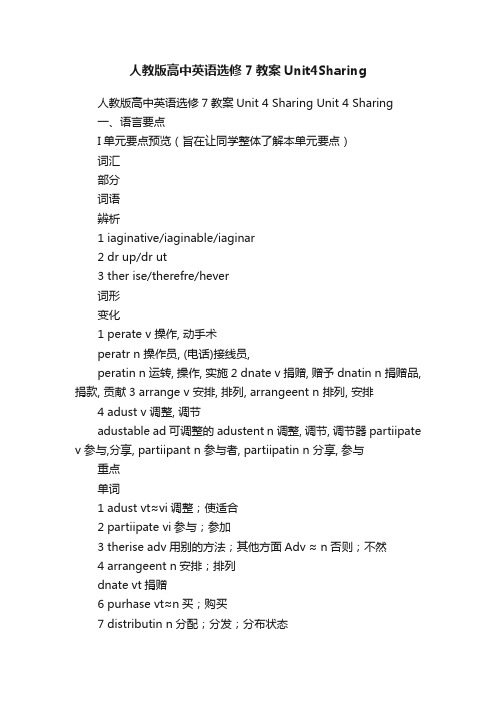
人教版高中英语选修7教案Unit4Sharing人教版高中英语选修7教案Unit 4 Sharing Unit 4 Sharing一、语言要点I单元要点预览(旨在让同学整体了解本单元要点)词汇部分词语辨析1 iaginative/iaginable/iaginar2 dr up/dr ut3 ther ise/therefre/hever词形变化1 perate v 操作, 动手术peratr n 操作员, (电话)接线员,peratin n 运转, 操作, 实施2 dnate v 捐赠, 赠予dnatin n 捐赠品, 捐款, 贡献3 arrange v 安排, 排列, arrangeent n 排列, 安排4 adust v 调整, 调节adustable ad可调整的adustent n 调整, 调节, 调节器partiipate v 参与,分享, partiipant n 参与者, partiipatin n 分享, 参与重点单词1 adust vt≈vi调整;使适合2 partiipate vi参与;参加3 therise adv用别的方法;其他方面Adv ≈ n否则;不然4 arrangeent n安排;排列dnate vt捐赠6 purhase vt≈n买;购买7 distributin n分配;分发;分布状态8 relevant ad 有关的, 相应的9 perate v 操作, 运转, 开动, 起作用重点词组(be) ding t 极想;渴望the ther da 几天前sti ut 伸出in need 在困难中;在危急中重点句型1 hen I reah the shl grunds there are lts f “gd rning” fr e fr the bs2 u ased hether I’getting t n an lal peple3 The gift vers the st f exerise bs and textbs fr unit priar shls that perate inpr r rete villages重点语法限制性定语从句(见语法专题)II 词语辨析(旨在提供完形填空所需材料) 1) iaginative/iaginable/iaginar ad【解释】iaginative富有想象力的,创新的iaginable可想象得到的iaginar想象中的,虚构的【练习】选择iaginative/iaginable或iaginar并用其适当的形式填空1) Althugh the ain haraters in the nvel are s true t life, the are _______2) It’s _______ fr suh an _______ riter t reate _______ stries3) This is the nl slutin _________4) The faus pe as fr an ______ petes: 1) iaginar 2) iaginable; iaginative ; iaginar 3) iaginable 4) iaginative。
人教版高中英语选修7教案Unit 4 Sharing

人教版高中英语选修7教案Unit 4SharingUnit4Sharing一、语言要点I单元要点预览(旨在让同学整体了解本单元要点)词汇部分词语辨析1.imaginative/imaginable/imaginary2.dryup/dryout3.otherwise/therefore/however词形变化 1.operatev.操作,动手术operatorn.操作员,接线员,operationn.运转,操作,实施 2.donatev.捐赠,赠予donationn.捐赠品,捐款,贡献 3.arrangev.安排,排列,arrangementn.排列,安排4.adjustv.调整,调节adjustableadj.可调整的adjustmentn.调整,调节,调节器5.participatev.参与,分享,participantn.参与者,participationn.分享,参与重点单词1.adjustvt.&vi.调整;使适合.2.participatevi.参与;参加.3.otherwiseadv.用别的方法;其他方面.Adv&conj.否则;不然4.arrangementn.安排;排列.5.donatevt.捐赠.6.purchasevt.&n.买;购买.7.distributionn.分配;分发;分布状态.8.relevantadj.有关的,相应的9.operatev.操作,运转,开动,起作用重点词组dyingto.极想;渴望.theotherday几天前stickout.伸出inneed.在困难中;在危急中.重点句型1.whenIreachtheschoolgroundstherearelotsof “goodmorning”formefromtheboys.2.youaskedwhetherI’mgettingtoknowanylocalpeople.3.Thegiftcoversthecost ofexercisebooksandtextbooksforcommunityprimaryschoo lsthatoperateinpoororremotevillages.重点语法限制性定语从句II词语辨析1).imaginative/imaginable/imaginaryadj.【解释】imaginative富有想象力的,创新的imaginable可想象得到的imaginary想象中的,虚构的【练习】选择imaginative/imaginable或imaginary并用其适当的形式填空1)Althoughthemaincharactersinthenovelaresotruetolif e,theyare_______.2)It’s_______forsuchan_______writertocreate_______storie s.3)Thisistheonlysolution_________.4)Thefamouspoemwasfroman______poet.keys:1)imaginary2)imaginable;ima ginative;imaginary3)imaginable4)imaginative2).dryup /dryout【解释】dryup使完全变干;(河流,湖泊等)干涸dryout变干,干透【练习】选择dryup或dryout,并用其适当的形式填空1)Thefarmerspumpedwatertotheirfieldstostopthesoil__ ______.2)Thepool________inthelateautumn.3)Thevillag ershadtowaitforthesunto_________thedirtroad.4)Don’tleavethevegetableonthetable,oritwill________.keys: 1)dryingout2)driesup3)dryup4)dryout3)otherwise/ther efore/however【解释】otherwise否则;不然thereforeadv.因此,所以however无论如何,可是【练习】选择otherwise/therefore或however并用其适当的形式填空1)Hedidn'tworkhardatEnglish_______hewouldn'tfinditd ifficulttolearnnow.2)wedonothaveenoughmoney._____ ____wecannotaffordtobuythenewcar.3)Thefirstpartwas easy;thesecond,________,tookhours.4)Heisnoisy,but________aniceboy.5)weweregoingtoplayfootball,butitwassohotthatwedecidedtodo_____________.keys:1 )otherwise2)Therefore3)however4)otherwise5)otherwiseIII词性变化(旨在提供语法填空所需材料)1.operatev.操作,动手术operatorn.操作员,接线员,operationn.运转,操作,实施2.donatev.捐赠,赠予donationn.捐赠品,捐款,贡献 3.arrangev.安排,排列,arrangementn.排列,安排 4.adjustv.调整,调节adjustableadj.可调整的adjustmentn.调整,调节,调节器5.participatev.参与,分享,participantn.参与者,participationn.分享,参与【练习】根据句子结构,用括号内所提供词的适当形式填空1)Theyencouragedthe_______to_______inthesingingperf ormanceafterthecontest..2)Thedoctorare________onan______ofafactorywhogotinjuredwhen_______amachine,and the________issaidtolastovertenhours.3)Theseatsinthe planeare________,andyoucan________themtoacertainang le.The______isnotdifficulttomake.4)Thedrinkswere________tothembycocacolacompanyandtheyreceived_______f romothercompaniesaswell.5)ourdepartmentwillbeinchar geof_______theconference.wouldyoupleasegiveussomesu ggestionsonthe_______forit?keys:1)participants;part icipate2)operating;operator;operating;operation3)ad justable;adjust;adjustment4)donated;donation5)arran ging;arrangementIV重点词汇(旨在提供综合运用所需材料)1.adjustvt.&vi.调整;使适合.[重点用法]adjustmentn.调整;修正adjustableadj.可调节的;可调整的adjust使适应;适应。
- 1、下载文档前请自行甄别文档内容的完整性,平台不提供额外的编辑、内容补充、找答案等附加服务。
- 2、"仅部分预览"的文档,不可在线预览部分如存在完整性等问题,可反馈申请退款(可完整预览的文档不适用该条件!)。
- 3、如文档侵犯您的权益,请联系客服反馈,我们会尽快为您处理(人工客服工作时间:9:00-18:30)。
Unit 4Sharing教材分析本单元的话题是Sharing,主要涉及帮助弱者、志愿服务、合作分享等。
通过听、说、读、写等各种活动学习相关的语言知识,使学生了解世界上很多地方依然很落后,从而懂得同情,学会分享。
了解一些志愿者工作的信息,培养学生互助合作的精神和社会责任感。
结合针对短文话题的探讨激发学生的国际意识,通过各种渠道力所能及地为贫困地区的孩子作出自己的贡献。
Warming Up部分是一个调查,分成三项任务:首先回顾自己曾经做过的助人为乐的好事,并采访三位同学;然后,根据调查内容列举班级同学所做的好事;最后讨论volunteer的内涵。
通过这些任务,让学生懂得什么是“帮助”,反思自己是否乐于助人,以及怎样做才是“志愿者”,由此为后面的短文学习做好铺垫。
Pre-reading是Reading的热身活动。
交代了阅读文章的文体(letter)和作者(a young Australian woman,Jo),还根据她在PNG拍的10张照片提出了5个问题,回答这些问题有助于学生加深理解“志愿者活动”的意义。
Reading是一篇Jo写给Rosemary的信。
其中介绍Jo在PNG(Papua New Guinea)的一个小山村教书。
在她写给Rosemary的信中,作者描述了该村学校的情况和去一个学生家做客的经历,使学生感受到PNG的儿童生活处境的艰难,更加珍惜自己的学习机会。
Comprehending是根据短文设计的阅读理解试题。
第一个练习要求学生读懂书信的内容,用表格的形式帮助学生整理书信中提到的关于巴布亚新几内亚村落生活及风俗习惯的信息,属于细节题。
第二个练习要求学生对文中提到的五个现象进行分析,说明原因,属于细节推理题。
第三个练习要求学生通过阅读分析生活在小山村中的积极面和消极面,这个练习进一步地开阔学生的思维,使学生对艰苦的生活有更深的理解。
第四个练习要求学生小组活动,讨论四个问题,进一步巩固学生对于课文内容的理解,并且让学生联系自己的实际情况,通过比较校舍、教学条件、生活状况等方面的问题,引发学生的深层思考,谈谈自己是否愿意参加志愿者活动。
第三、四两个练习都属于深层思考的问题。
Learning about Language分词汇和语法两部分。
其中,第一部分是有关此篇短文中的重点单词和短语。
设置了三个练习,一是根据所给解释从所学词汇中选择相应的单词;二是用恰当的词汇完成一篇短文;三是根据解释组成词组,并用词组编对话。
第二部分是有关限制性定语从句的复习。
首先从课文中找出含有限制性定语从句的句子;然后用定语从句完成句子,对定语从句加以运用;再用含有定语从句的句子回答问题;最后是两人结对活动,进一步练习使用定语从句。
Using Language是对Reading的延伸。
通过阅读,参与“Give an unusual gift”的活动。
这个部分由三个部分组成,综合训练学生听说读写四个方面的能力。
“读与说”通过图文结合的方式,介绍了一些特殊的礼品——为穷人和真正需要它们的人选购礼品。
阅读之后,完成两个练习:回答问题和把礼物名称和详细介绍配对。
“听与说”部分是采访默里大夫的经历,以听力训练为核心设置了四个活动。
1.讲述一个人的生平,用到了时间表达法;2.通过列表把握听力中的细节;3.在涉及听力内容之前让学生先就有关听力中的话题进行讨论,有助于学生快速并准确地把握听力内容;4.展开讨论,让学生思考自己将来是否愿意像默里大夫那样做个志愿服务工作者。
“写作”根据“听与说”中的话题,运用时间表达方式,根据给出的6个方面对默里大夫的情况进行写作。
课时划分在对本单元的各部分材料进行分析、整合后,确定了以下六个重点课时:课时一:Warming Up and Listening(听力课)从话题内容和训练目的来看,Warming Up与Using Language中的Listening and speaking 比较接近,所以将Warming Up与Listening and speaking的第1、2、3题和Workbook中的Listening以及Listening Task整合在一起,设计成任务型“听力课”,以训练听前预测的能力和学习用时间表达方式来介绍一个人的生平经历的方法。
课时二:Speaking(口语课)将上一节听力课剩下的部分Listening and speaking中的第4题和Workbook中与上节课听力内容相关的Talking以及Speaking Task整合在一起,设计成“口语课”,训练学生用英语表达自己的观点,并且说明这样做的理由。
课时三:Pre-reading and Reading(阅读课)这篇课文是一个志愿者的一封家书,她在巴布亚新几内亚共和国的一个小山村教书。
信中详细地描述了她所在学校的情况和她去一个学生家做客的经历。
通过这封信,学生可以了解巴布亚新几内亚共和国各部落的生活状况和风俗习惯,同时能够更好地理解志愿者的工作。
课时四:Grammar(语法复习课)本单元的语法重点是复习限制性定语从句(Restrictive Attributive Clause)。
学生已经学过这个语法点,所以在这节课中,首先对限制性定语从句的特征、关系词做一个简要回顾,然后通过多种形式的练习,如填写关系词、造句和翻译等,使学生逐步掌握限制性定语从句的用法。
这些教学环节,如开始部分的听句子、猜同学的游戏和结束部分的翻译或写作练习,都充分体现了在语境中学习语法、在语境中运用语法的教学原则。
课时五:Reading,Speaking and Writing Task(综合运用课)这节语言综合运用课把本单元的第二篇文章和课后练习中的写作练习组合到一起。
一方面是由于这篇文章——“世界上最有用的礼物清单”,内容比较简单,不需要用一整节课来完成;另一方面是课后练习的写作任务——给一个被自己资助的孩子写封信,既切合本单元帮助他人的主题,题目中又已经列出了书信的结构,书信的内容也是介绍自己的学习生活,能够与学生的实际结合起来,学生写起来有话可说。
课时六:Summing Up and Learning Tip(总结复习课)复习课分成四个板块,板块一是复习课文内容和重要的词组句型。
复习课文内容可以通过根据关键词组复述课文、回答问题和学生互批作文(用100词左右写一篇介绍部落生活和风俗的文章)等活动来完成。
这篇作文是阅读课的家庭作业,放在此处,既检查了作业,又有助于课文的复习。
板块二是复习语言知识,主要是用翻译、填词以及句型转换来复习。
板块三是总结和概括语法项目。
指导学生完成表格填充、知识树,使学生在脑海中对限制性定语从句形成一个完整的概念。
板块四是总结。
讨论分享的意义,让学生对于本单元的主题有更加清晰完整的认识,并且由生活中的分享谈到学习上的互相合作与分享,即Learning Tip的内容。
学情分析1.学生经过高中阶段必修1~选修6的学习,具备了一定的阅读技能,如查找细节信息,猜测词义,抓住段落要点和全文大意等,在阅读速度方面也有了较大的提高,这有助于学生较好地完成这个单元的课文阅读。
同时,在听、说、写等方面也有了一定的基础。
2.这个单元的话题是分享、帮助与合作。
对于高二的学生而言,他们的价值观人生观已经基本形成,要想通过一个单元的学习,完全改变学生的价值观,难度比较大,但教师可以通过本单元安排的内容,如阅读志愿者的家书,了解一些捐助机构的工作,帮助学生认识这个世界,理解互助合作的意义,即在帮助他人的过程中实现自己的人生价值。
3.学生在这个单元的学习过程中需要用到预习策略、搜集分析信息策略、归纳整理策略及高效复习策略等。
Period 1Warming Up and Listening教学目标1.语言知识目标a.认识以下单词和短语:volunteer,clinic,challenging,over the last few years,in the future,in two weeks' time,a couple of,developing country,Medecins Sans Frontieres(MSF),Malawi,Sudan,The Fred Hollows Foundation,The Cancer Council,Youth in the City,go blind,beliefb.注意以下几个重要句型:Why did Mary decide to work in a developing country?In the Sudan,why was it nearly impossible for Mary to get to the clinics when the rains came?Why were conditions in the clinics in the Sudan challenging?2.语言技能目标通过听一段采访,了解默里大夫作为一个志愿者为Medecins Sans Frontieres(MSF)工作的经历,提高学生听前预测、注意细节信息等听力方面的技能。
3.语言能力目标提高学生注意细节信息的听力能力,同时理解听力材料中出现的一些重要的词汇和表达方式。
4.情感态度与文化意识目标借助听力材料,让学生思考自己将来是否愿意像默里大夫那样做志愿服务工作。
把学生的生活实际和所听到的内容结合起来,能够培养学生正确的价值观。
重点难点1.教学重点:a.学会边听边注意听力材料中的细节信息,并做笔记。
b.在讲述个人生平时,常采用时间表达法。
学会关注对话中的时间表达法以及出现的先后次序。
2.教学难点:a.根据列表掌握听力中的细节信息。
b.学习采用时间表达法来表述一个人的生平。
教学方法听力教学与合作学习教学过程Step 1Lead-in1.T:Have you ever helped others?What did you do to help your parents?Or other relatives?Or your friends?Or people in your community?Or people outside your community?I'm sure youWhat do you do to help... Name:Name:Name:1.your parents?2.other relatives?3.your friends?4.people in your community?5.people outside your community?Suggested answers:What do you do tohelp...Name:Tom Name:Helen Name:Mary 1.your parents?Clean the floor. Wash dishes. Prepare supper.2.other relatives?Lend my books andCDs to them.Take care of mycousin while hisparents are away.Comfort them whenthey are sad.3.your friends?Repair theircomputers.Help them with thelessons.Do shopping withthem.4.people in your community?Be a coach of thefootball lovers.Sing and dance for theelders.Help my neighbourscarry things home.5.people outside your community?Plant trees.Help people withdisabilities.Return the wallet tothe owner.survey form.3.Discuss whether someone who helps the groups on the survey form can be called a “volunteer”.T:Which one can be called a volunteer?Or what kind of things do volunteers do?Only those who work not for rewards—especially money and materials,and are not forced to do so are volunteers.And not only the person but also the society and the environment benefit from it.For example,Dr Mary Murray was a volunteer working for Medecins Sans Frontieres(MSF).Step 2Pre-listeningNow turn to Page 35,read Exercises 1 and 2 in Listening and speaking,and predict what you will hear in the listening material.You can also discuss with your partner.S1:Now Jennifer Wells is interviewing Dr Mary Murray about what has happened in Mary's life.S2:She once worked in a clinic in Malawi and Sudan.S3:Malawi and Sudan are developing countries.S4:Many children died when she worked in Malawi.S5:Conditions in the clinics in the Sudan were very terrible and challenging.S6:Medecins Sans Frontieres(MSF)is an organization that provides free medical care to children in poor countries.T:You see,before listening to the interview,you can get much information,if you study the questions carefully.Now let's listen to the interview.Please pay attention to the time expressions because they use time expressions to talk about Mary's life.And then number them in the order you hear them.______ in the future ______ during the 1980s______ for a couple of months ______over the last few years______ for a further six months ______ in two weeks' timeStep 3Listening1.(The teacher plays the tape and the students listen to it.)T:Now let's check the answers of Exercise 1.Keys:__4__ in the future __1__ during the 1980s__2__ for a couple of months __3__ over the last few years__6__ for a further six months __5__ in two weeks' time2.T:Listen again.When you are listening,you can make notes of Mary's experiences in theTime Place EventThe 1980s199219972001NowFutureTime Place EventThe 1980s Sydney Studied medicine.Got to know two African students.1992 Africa Visited her two African friends and their families.Worked in their local health clinic for a couple of months.1997 Malawi V olunteered with MSF.Worked with children affected by HIV/AIDS.2001 the Sudan Conditions were very challenging because of the heat,the rains,the basic conditions in the clinics.Now Australia Has returned for two weeks.Future Will return to the Sudan for six more months.After that,will probably return to Africa again.your answers.(1)Why did Mary decide to work in a developing country?(2)When Mary worked in a clinic in Malawi,why did the children die?(3)In the Sudan,why was it nearly impossible for Mary to get to the clinics when the rains came?(4)Why were conditions in the clinics in the Sudan challenging?(5)Why does Mary enjoy her job?Suggested answers:(1)Because when she worked in an African health clinic,she saw children with illnesses that could be prevented.(2)Because the clinics didn't have enough medicines.(3)Because the roads became so muddy that they spent most of their time digging the car out.(4)Because it could be very hot;it could be nearly impossible to get to the clinics when it rained;the clinics were very basic and the only tools she had were a stethoscope and her hands.(5)She feels she is helping people who otherwise may not get help.Step 4Listening on Page 70T:Perhaps you may wonder what we can do to serve communities outside the school?OK,do Listening in the Workbook on Page 70.First predict what you will hear,according to the picture and Exercise 1.1.Listen to their discussion and number the items below in the order that you first hear them. ______ The Cancer Council(委员会)______ old people______ the environment ______ Youth in the City______ Plan International ______ children in hospital______ serving soup to the homeless ______ The Fred Hollows FoundationKeys:__3__ The Cancer Council(委员会) __6__ old people__8__ the environment __4__ Youth in the City__1__ Plan International __7__ children in hospital__5__ serving soup to the homeless __2__ The Fred Hollows FoundationOrganization Who suggested it?What does it do?1.Plan International Jason Mick Annie2.The Fred Hollows Foundation Jason Mick Annie3.The Cancer Council Jason Mick Annie4.Youth in the City Jason Mick AnnieKeys:Organization Who suggested it?W hat does it do?1.Plan International Mick Sponors children from poor countries.2.The Fred Hollows Foundation Annie Helps blind people get their sight back.3.The Cancer Council Jason Does research into cancer.4.Youth in the City Mick Supports young people financially to stay on at school.3.Listen again and list the students' suggestions for raising money.________________________________________________________________________________________________________________________________________________________________________________________________________________________Suggested answers:1.Run some competitions at lunchtime.2.Have a concert or movie night.3.Have a basketball match.4.Have a personal challenge,like getting someone to sponsor students for walking 25 kilometres.4.Listen again and list the ways the students could give their time.________________________________________________________________________________________________________________________________________________________________________________________________________________________Suggested answers:1.Serve soup to homeless people on Fridays.2.Visit old people and children in hospital every week.3.Do something for the environment,like tree planting or cleaning up rubbish.Step 5ConclusionT:We have listened to two materials about giving help to others.I do hope all of us will help those who need help.Remember:You can predict what you will hear before listening.While listening,you should pay attention to the time expressions in the passage which is about some person's experiences.Homework:1.Finish the Listening Task on Pages 75-76.Try to predict what you will hear according to the given information and also pay attention to the time expressions.2.Look for more information about MSF on the Internet and share it with your partner.。
